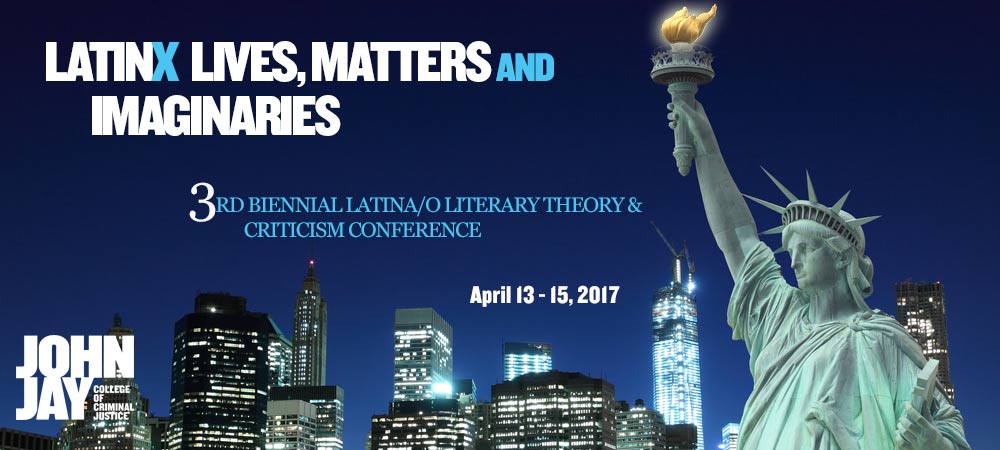About the Conference
If as WEB Dubois declared, “The problem of the 20th Century is the problem of the color line” then the first decades of the 21st century have only served to amplify and reveal this “problem,” bringing to light just how ingrained the “color line” is in American life. For the last two centuries, Latinx writers have challenged Black/White divisions to offer alternative racial imaginaries insisting on dynamic identificatory forms from Creoleness to Mestizaje, Brownness to Afro-Latinidad. Yet the ideology of race has proven structurally sound, a versatile and dogmatic logic impressed over generations into our social, historic, and psychic lives. Indeed, the effectiveness of race lies in its insidious linking to the pitfalls of class, labor, and other exploitative conditions that systematically conjoin race to a network of deficits. Latinx literature challenges these hegemonic formulations chronicling “from below”, in Juan Flores’ sense, conventional notions of identity through an irruptive “learning and turning” whose imaginative procedure opens, with the churning vitality of a salsa dance, into new social and political possibilities. In this sense, Latinx literature insists on the ethical expansion of racial and ethnic parameters through the development of alternative imaginaries. As discourses on race morph and intensify, as technology displays the brutality of race in real time, and as the hegemonic hold of Whiteness starts to give way to the ineluctable diversification of the nation, the nuanced representation of race becomes ever more important. This radical juncture, we claim, calls for a revisiting of Latinx literature as the site where artists “create dangerously” for critics “who read dangerously”, as Edwidge Danticat put it, so as to further inform and revitalize a critical consciousness attuned to more just, more complex, and reimagined modes of existence. This conference takes up the matter of race on the lives and imaginaries of Latinx populations.
We welcome papers that explore race in its historic, social, political, and theoretical dimensions or that chart the temporal and spatial coordinates of race in Latinx literary production. We also encourage presentations that analyze how Latinx literature explores the nuances of racial constructions and representations and how Latinx authors find in race a resource to imagine just, empowering, and collective futures. Additionaly, we anticipate submissions that examine the intersections of race gender, sex, sexuality, and class, which re-theorize relations of power and create alternative sites of possibility, engagement, and critique.
Latinx Lives, Matters, and Imaginaries honors the spirit of the late Juan Flores whose scholarship put race and class at the center of his work. His imprint and prodigious intellectual legacy exhorts Latina/o literary criticism to keep race at the center of our theoretical concerns.
We look for papers and panels that include, but are not limited to, the following:
- Racial discourse
- Creoleness in the Hood
- Afro-Latinidades
- Mestizaje and Borderlands
- Brown Commons
- Race and Diaspora
- Race and Immigration
- Geographies of Race
- Race and Bare Life
- Race and the Politics of Exile
- Indigenous Imaginaries and Race
- Affective States of Race
- Latinx Performance and Race
- Phenomenologies of Race
- Class and Race
- Diaspora, Displacement, and Relocation
- Subjectivity and Race
- Race, Violence, and Incarceration
- En/Gendering Race
- Queer Racial Futures
- Dis-Abilities Studies and Race
- Pedagogy and Racial Subversion
- (Post)Coloniality of Race
- Transnationalism, Hemispheric Studies, and Race
- Age of Global Capital and Race
- Human Rights and Racial Activism
- Intersections of Feminism and Race
- Race in Poetry, Drama, and the Graphic Novel
- Race in Latinx Cinema and Literature
- Race in Latinx Visual Cultures and Literature
- Race in Latinx Music and Literature
- Latinx Utopias and Race
- Space and Time of Race
Proposals for panels or individual papers are welcomed. Undergraduate and graduate submissions are encouraged.
In addition to two days of presentations by scholars from across the country, this conference will include the following special events:
Thursday April 13th, 2017: Keynote address by Claudia Milian, Associate Professor of Spanish and Latin American Studies, Duke University
Saturday April 15th, 2017: Conversation with Cherríe Moraga, author, A Xicana Codex of Changing Consciousness: Writings 2000-2010; The Hungry Woman; Heroes and Saints and Other Plays; co-editor This Bridge Called My Back: Writings by Radical Women of Color.
Dr. Marta Moreno Vega, author of When the Spirits Dance Mambo: Growing Up Nuyorican in El Barrio; Women Warriors of Afro-Latina Diaspora; and The Altar of My Soul: The Living Traditions of Santeria.
Miriam Jiménez Román, moderator, Executive Director Afro-Latin@ Forum, co-editor The Afro-Latina/o Reader: History and Culture of the United States.
Please send abstracts of 250 words and queries to Professor Richard Perez and Belinda Linn Rincón at latlitconfnyc@gmail.com.
Dates:
Due date for abstracts: December 12th, 2016
Notification of acceptance: January 16th, 2017
Pre-registration dates: January 17th - March 15th, 2017
Conference dates: April 13th-15th, 2017
Conference Registration Fees:
Full-time and adjunct faculty: $150 (pre-registration); $200 (onsite registration)
Graduate students: $75 (pre-registration); $100 (onsite registration)
Undergraduate students: $20 (registration)
John Jay College undergraduates and graduates: free
Non-presenters: $50

